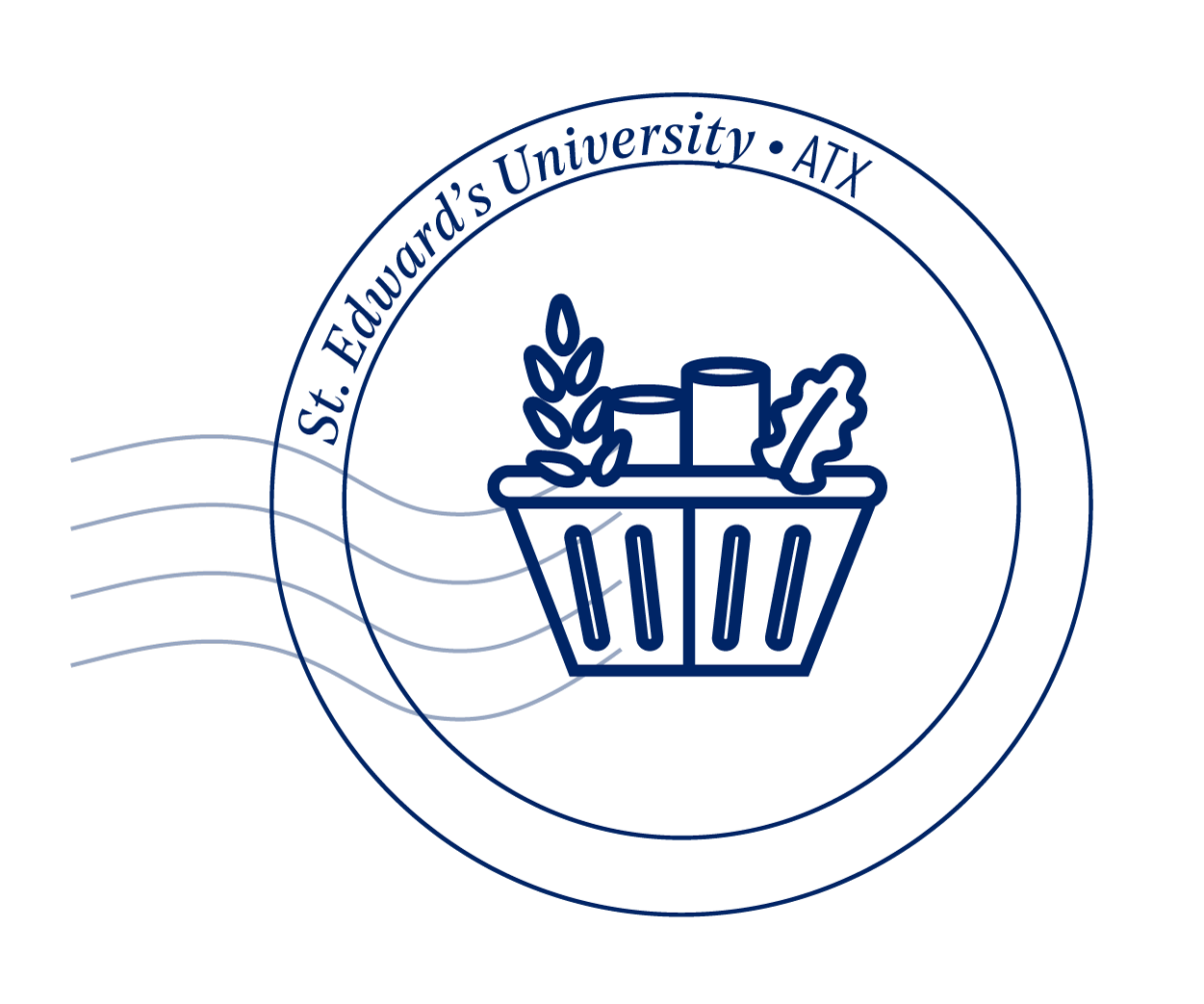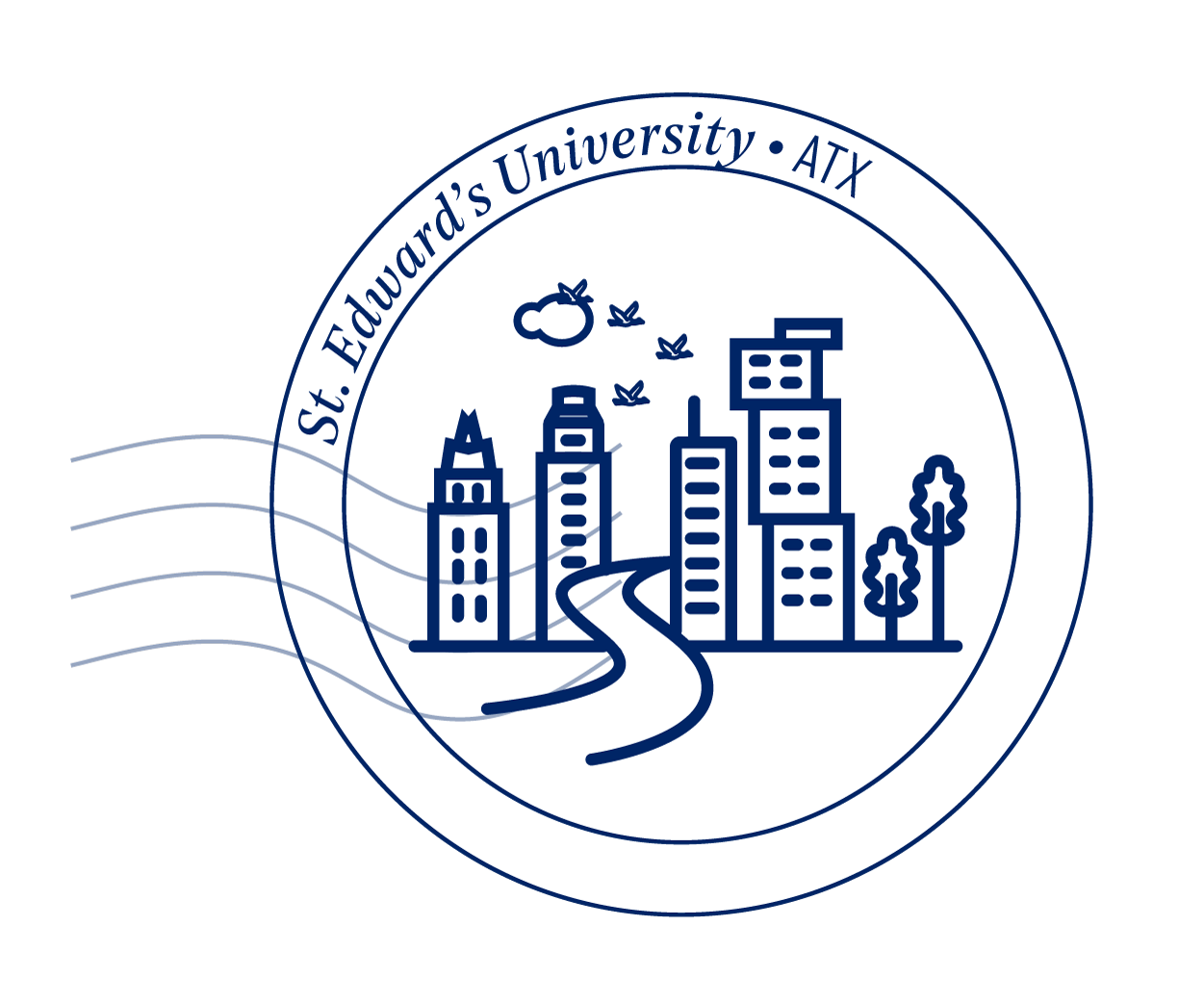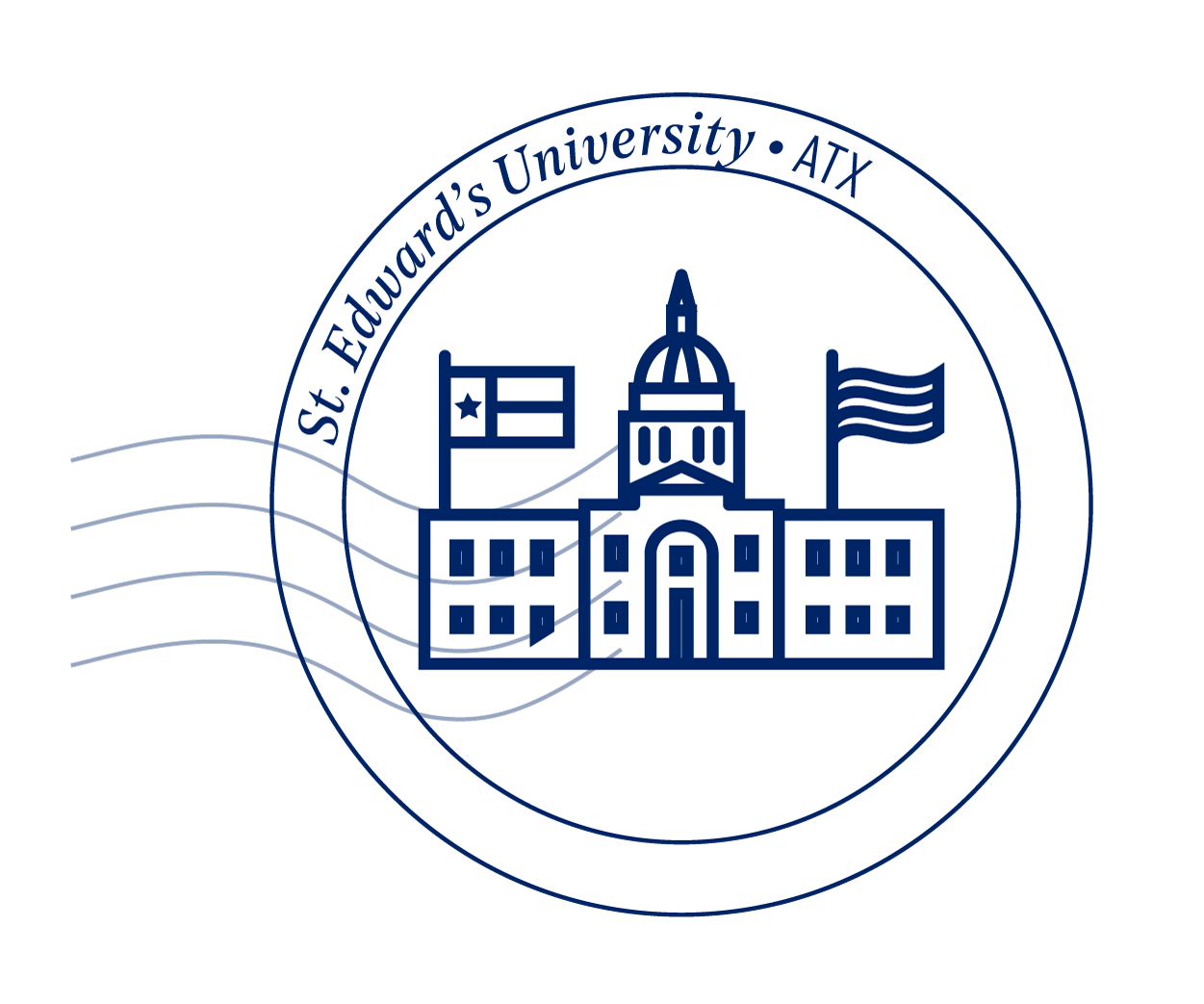Every semester, our students and faculty delve into research and projects that benefit the campus, community and world around us.
In these snapshots (1-minute reads), you’ll get to know some of the diverse, independent problem solvers at St. Edward’s who are confronting critical issues and making the world a better place.
In the Garden

During the pandemic last year, Luke Tobias, a Biology and Pre-Med Junior, spent a few hours a day digging in the dirt, transforming a slightly neglected garden behind Teresa Hall into a bright spot on campus, complete with new garden beds and picnic tables where students can sit and enjoy a sunny afternoon.
Under Tobias’ leadership, volunteers have grown to 15 students from Students for Sustainability who regularly help tend the garden, which is a mix of vegetables and pollinator plants. This fall, they will harvest and donate fresh produce to local food banks and the on-campus food pantry.
Additionally, Tobias started a “Rent-a-Plot” program that lets students manage and care for their own garden on the hilltop. At times, the garden serves as an open-air classroom. Environmental Science faculty Peter Beck and Amy Concilio bring their classes to the garden for presentations or mini gardening work days.
Looking ahead, Students for Sustainability hope to secure new grant funding to be able to add more raised garden beds and a fruit tree orchard. For now, they can enjoy the fruits of their labor. What does Tobias enjoy most? “The relaxation. Going and enjoying nature in a peaceful space,” Tobias said. “Students can go and relax from school, and grow their own food. It really is a life skill — it’s good to know how to navigate the process of gardening.”
Watch KVUE’s news story on the Student Garden.
Learn more about sustainability initiatives at St. Edward’s.
In City Hall

When it comes to hunger on college campuses, the numbers are daunting — 35% of students cited hunger as one of the reasons why they are unable to study, focus in class or stay in school at all, opting to drop out instead, according to a 2020 study.
So when Jessica Riley ’21 was appointed co-chair of the City of Austin’s College Student Commission, she and her St. Edward’s peers wanted to gain a better understanding of the food insecurity problem. First, they worked with Central Texas Food Bank and other leaders to see how hunger was tackled across the community.
After more than a year of research, they proposed and helped secure the creation of a $50,000 food insecurity grant aimed at funding food insecurity programs at Austin-area college campuses. The city’s grant funding will likely be available by the spring 2022 semester.
“We want program leaders to apply for the grant and to use it to feed their students,” Riley said. “Eventually, we hope that we will be able to learn from them what works and what may need to change.”
If you or someone you know is facing food insecurity at St. Edward’s, please visit the Dean of Students Office.
At the Wild Basin

The Covid-19 lockdown in 2020 presented a rare opportunity for both wildlife and researchers — a break from the constant hum of traffic.
To take advantage of the absence of road noise, Darren Proppe, research director at the Wild Basin Wilderness Preserve and Creative Research Center, began collecting acoustic samples and video recordings each week. This year, Proppe enlisted the help of Environmental Chemistry Senior Ederé Ohwobete to replicate each recording in 2021, matching them by date and time.
After comparing the recordings, they confirmed that there was less traffic noise in 2020 and that a greater variety of wildlife sounds could be heard with that reduction in noise. Scientific literature has shown that quieter soundscapes facilitate better communication for species that use auditory signals, including songbirds, bats, frogs and insects.
“This kind of comparison may never happen again,” Proppe said, adding that their findings will be part of a larger scientific database. “It also provides a foundation of understanding that noise matters. People can ask, ‘What can we do in our own backyard to keep those noise levels low?’”
Ohwobete agrees, saying “We have to work with urban planners and others to make sure that the city remains as conducive to wildlife as possible. One of the reasons we love Austin is because it’s green and there are so many trails within 15 minutes. As much as we love these things, we need to make sure they are protected.”
Learn more about the Wild Basin Creative Research Center.
At the Capitol

Lamar Medley, a senior in Social Work and Army veteran, is putting his St. Edward's education to use, effecting real change in his community. In a short time, he has co-authored a chapter in an upcoming book, interned at OutYouth, and advocated for LGBTQ youth at the Texas legislature.
It was during Medley’s internship at OutYouth, a nonprofit aimed at providing support for LGBTQIA+ youth, that he gained a better understanding of HB25, a bill limiting transgender athletes’ participation in sports. Listening to youth talk about how HB25 would affect them inspired Medley to partner with Equality Texas and the Transgender Education Network of Texas to advocate at the Texas Capitol against its passage.
“This bill is extremely detrimental to the mental health of LGBTQ youth, not to mention black women and girls who are often hypermasculinized and have their bodies over scrutinized,” Medley said. The passage of the bill this fall “makes me want to double down on my commitment to LGBTQ youth and to make a better future for them.”
Natalie Beck Aguilera, assistant professor of Social Work, who asked Medley to co-author a book chapter on unpaid internships, says Medley is a “phenomenal example of a student living out the social work principles of advocating for clients on the micro and macro levels. Every day, social work students like Lamar are directly living out our mission of confronting the critical issues of society and seeking justice and peace.”
Learn more about Social Work.
From the Criminal Justice Major
When Victoria R. Garcia ’21 told friends or family that she was majoring in Criminal Justice, the response was often, “So you want to be a cop?”
A recent graduate who now works at The Sobering Center, Garcia knows Criminal Justice encompasses much more than law enforcement. Garcia is the outgoing president of Beta Phi Zeta, a chapter of the American Criminal Justice Association, which strives to give students who plan on pursuing a career in criminal justice exposure to the field through guest speakers, field trips, community service, and trainings.
The organization, founded and sponsored by Criminal Justice Assistant Professor Lisa Holleran, has grown to 21 members who are majoring or minoring in Criminal Justice, Criminology, Political Science, Forensic Science and Psychology.
“We have a holistic approach to Criminal Justice,” Garcia said. “Many associate the major with pursuing a career in law enforcement, but the field is very diverse. Some students become attorneys, judges, or work for programs like The Sobering Center that divert people away from the criminal justice system. We are dedicated to seeing all sides and bettering the field, which is why we choose this major.”
Learn more about Criminal Justice.
From the Marketing Class
This spring, Michael Manimbo ’21 and his thesis advisor, Sarah Mittal, assistant professor of Marketing, set out to better understand the practice of greenwashing in advertising and marketing and its effect on consumers. (Greenwashing is when producers and manufacturers exaggerate claims of a product’s environmental benefit to increase sales.)
Together, they tested different greenwashing strategies and found that, regardless of individuals' green/sustainable self-identity, customers were more likely to seek information and purchase the product that was marketed using most greenwashing tactics.
Their hope is that the research could push lawmakers to take greater action to combat greenwashing. Consumers aren’t able to research every product, so it’s up to “legislators to take a more heavy-hand to outlining what green marketing claims can be used and when,” Mittal said.
Learn more about Marketing.

